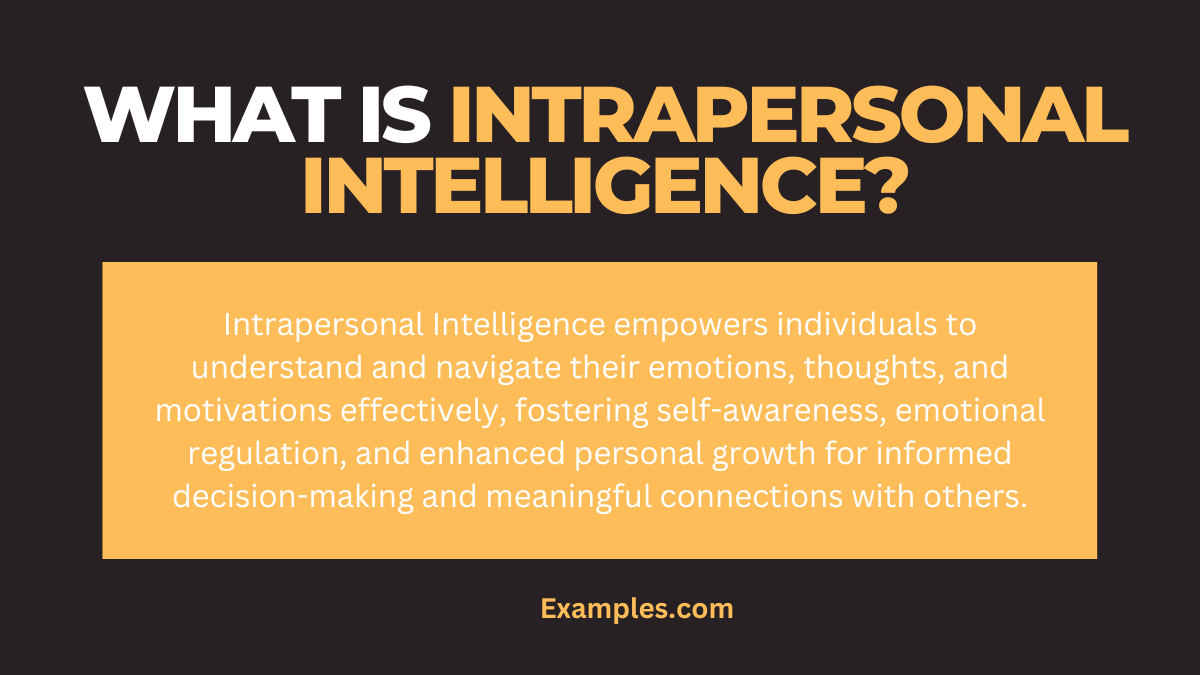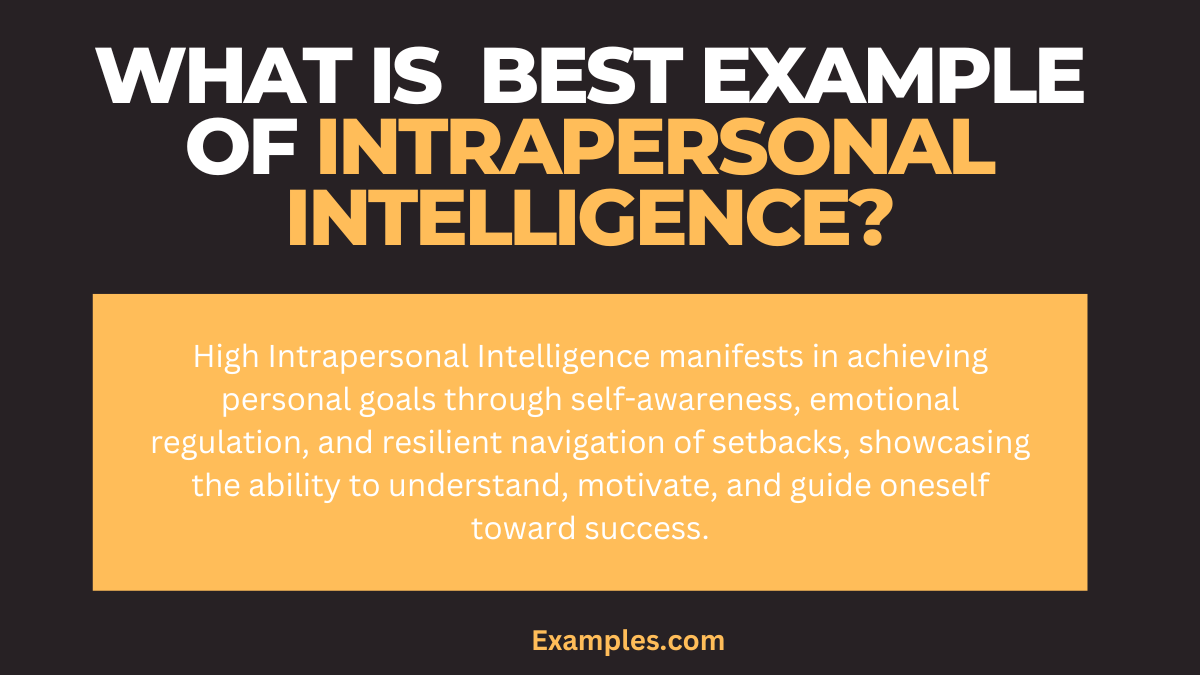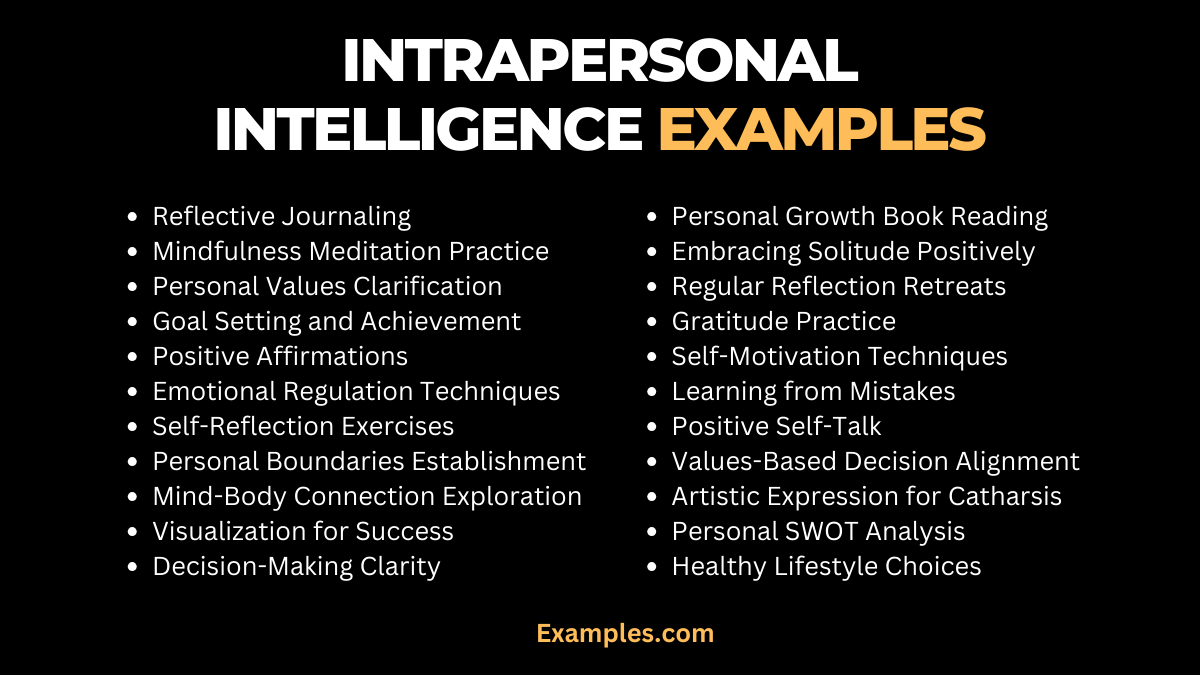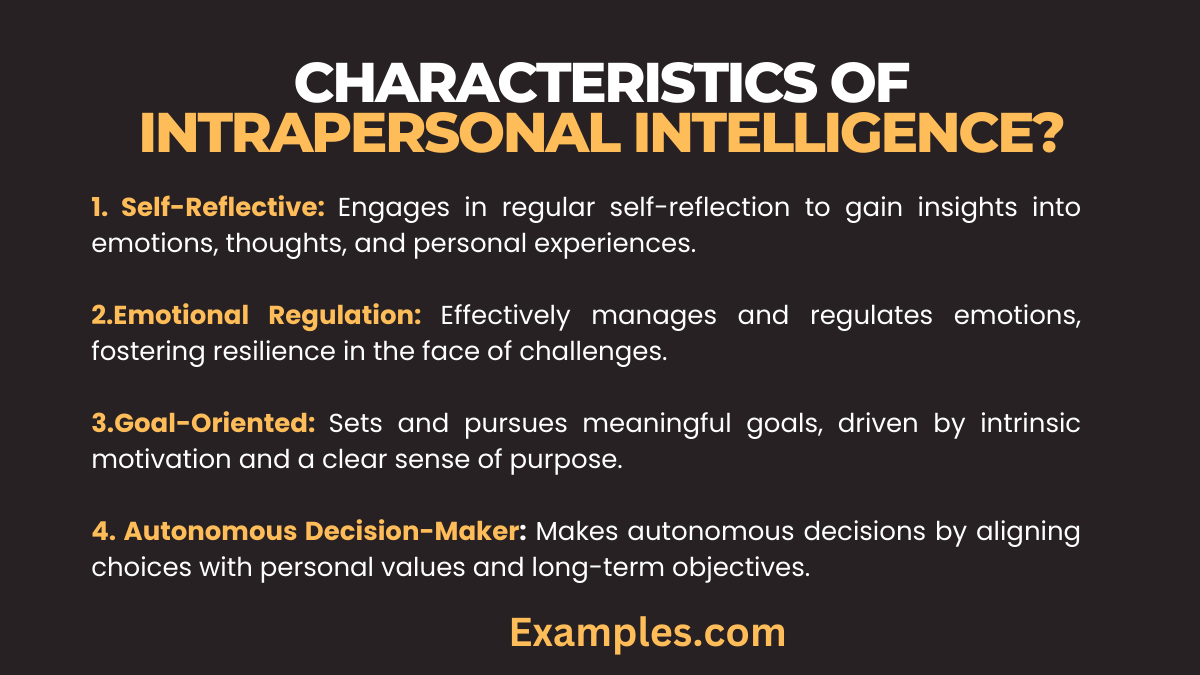24+ Intrapersonal Intelligence Examples
Embark on a transformative journey with our complete guide to Intrapersonal Intelligence. Delve into insightful examples and practical tips to enhance self-awareness and personal growth. Unlock the nuances of intrapersonal communication examples, providing a holistic understanding of effective self-dialogue and emotional intelligence. Empower yourself with the tools to navigate the intricacies of personal reflection and self-expression, fostering meaningful connections and personal development. Communication examples within intrapersonal realms await your exploration in this comprehensive guide.
What is Intrapersonal Intelligence?

Intrapersonal Intelligence refers to the ability to understand and navigate one’s own emotions, thoughts, and motivations effectively. This intelligence involves self-awareness, emotional regulation, and a deep understanding of one’s strengths and limitations. Individuals with high intrapersonal intelligence excel in self-reflection and can use this awareness to enhance personal growth, make informed decisions, and foster meaningful connections with others through enhanced self-expression and empathy.
What is the Best Example of Intrapersonal Intelligence?

Intrapersonal Intelligence shines through in the exemplary case of personal goal achievement. An individual demonstrating high intrapersonal intelligence sets a goal, reflects on their aspirations, and aligns actions with their values. Through self-awareness and emotional regulation, they navigate setbacks with resilience, adjusting strategies and staying focused on the long-term objective. This exemplifies the profound ability to understand, motivate, and guide oneself toward personal success, showcasing the true essence of intrapersonal intelligence in action.
25 Intrapersonal Intelligence Examples

Explore 25 diverse examples of Intrapersonal Intelligence, providing a comprehensive guide to self-awareness and personal growth. Each example showcases the unique ways individuals can navigate their inner world, fostering emotional intelligence and enhancing intrapersonal communication skills.
- Reflective Journaling: Engage in daily reflective journaling to understand and process emotions, fostering self-awareness and personal growth.
- Mindfulness Meditation Practice: Cultivate intrapersonal intelligence through regular mindfulness meditation, enhancing emotional regulation and mental clarity.
- Personal Values Clarification: Clearly define personal values, aligning actions with core beliefs for authentic decision-making and a sense of purpose.
- Goal Setting and Achievement: Set realistic and meaningful goals, utilizing self-motivation and resilience to achieve personal aspirations.
- Positive Affirmations: Embrace positive affirmations to nurture a positive self-image, reinforcing self-worth and confidence.
- Emotional Regulation Techniques: Develop effective emotional regulation techniques, such as deep breathing or visualization, for maintaining equilibrium in challenging situations.
- Self-Reflection Exercises: Engage in structured self-reflection exercises to assess personal strengths, weaknesses, and areas for growth.
- Personal Boundaries Establishment: Set and communicate personal boundaries, fostering healthy relationships and self-respect.
- Mind-Body Connection Exploration: Explore the mind-body connection through activities like yoga, emphasizing holistic well-being.
- Visualization for Success: Utilize visualization techniques to mentally rehearse and achieve desired outcomes in various aspects of life.
- Decision-Making Clarity: Achieve decision-making clarity by assessing personal values and aligning choices with long-term goals.
- Personal Growth Book Reading: Read books on personal growth and self-discovery, gaining insights and perspectives to foster intrapersonal intelligence.
- Embracing Solitude Positively: Embrace solitude positively, using alone time for self-reflection, creativity, and personal recharge.
- Effective Time Management Strategies: Develop and implement effective time management strategies, optimizing productivity and personal satisfaction.
- Gratitude Practice: Cultivate a gratitude practice to enhance emotional well-being and appreciate the positive aspects of life.
- Self-Motivation Techniques: Master self-motivation techniques, drawing inspiration from personal goals and aspirations.
- Learning from Mistakes: Embrace mistakes as opportunities for learning, demonstrating resilience and adaptability.
- Positive Self-Talk: Practice positive self-talk to combat self-doubt and foster a constructive inner dialogue.
- Values-Based Decision Alignment: Align decision-making with personal values, ensuring authenticity and integrity in choices.
- Artistic Expression for Catharsis: Use artistic expression (writing, painting, etc.) as a form of catharsis, channeling emotions into creative outlets.
- Personal SWOT Analysis: Conduct a personal SWOT analysis, identifying strengths, weaknesses, opportunities, and threats for strategic self-improvement.
- Healthy Lifestyle Choices: Make conscious, health-focused lifestyle choices, prioritizing physical and mental well-being.
- Regular Reflection Retreats: Plan regular reflection retreats to step back, gain perspective, and set intentional personal goals.
- Setting Healthy Personal Habits: Establish healthy personal habits, ensuring a foundation for overall well-being.
- Vision Board Creation: Create a vision board, visually representing personal goals and aspirations for daily motivation and focus.
Intrapersonal Intelligence in Teaching Examples
Explore how Intrapersonal Intelligence plays a pivotal role in teaching. This guide unveils how educators can leverage self-awareness and emotional intelligence to enhance teaching strategies and create a positive learning environment.
- Mindful Lesson Planning: Engage in mindful lesson planning, aligning teaching approaches with personal values and understanding emotional impact.
- Personalized Feedback Delivery: Utilize intrapersonal skills for personalized feedback delivery, adapting communication styles to meet individual student needs effectively.
- Self-Reflection for Continuous Improvement: Embrace regular self-reflection, identifying strengths and areas for growth to continually enhance teaching methods.
- Empathetic Classroom Management: Practice empathetic classroom management, responding to student needs with understanding and emotional intelligence.
- Authentic Student Connection: Foster authentic connections with students, showcasing genuine interest and care for their well-being and academic success.
Intrapersonal Intelligence in the Classroom Examples
Discover the transformative impact of Intrapersonal Intelligence in the classroom, cultivating self-awareness and personal growth. This guide explores how students can harness this intelligence to enhance emotional well-being, foster effective communication with peers and educators, and navigate the academic journey with resilience and adaptability.
- Mindful Learning Practices: Integrate mindful learning practices into the classroom routine to enhance students’ self-awareness and concentration.
- Goal-Setting Workshops: Conduct goal-setting workshops, empowering students to define personal and academic aspirations for increased motivation and focus.
- Self-Reflection Journals: Implement self-reflection journals for students to regularly explore emotions, experiences, and insights, promoting introspection and emotional intelligence.
- Values-Based Decision-Making Discussions: Facilitate discussions on values-based decision-making, encouraging students to align choices with their core values for ethical and intentional decision-making.
- Student-Led Conferences: Organize student-led conferences, providing opportunities for students to reflect on their academic progress, set goals, and communicate effectively with parents and educators.
Intrapersonal Intelligence in School Examples
Discover how Intrapersonal Intelligence manifests in a school setting, emphasizing the importance of self-awareness, emotional regulation, and interpersonal skills for creating a positive and supportive educational environment.
- Principal’s Decision-Making Clarity: The school principal demonstrates intrapersonal intelligence by aligning decisions with personal values, fostering a positive school culture.
- Teacher-Parent Empathy Dialogue: Intrapersonal skills shine through as teachers engage in empathetic dialogues with parents, understanding and addressing concerns effectively.
- Student Stress Management Workshops: Implement stress management workshops for students, empowering them with intrapersonal skills to navigate academic pressures.
- Conflict Resolution Training for Staff: School staff undergo conflict resolution training, enhancing intrapersonal skills for resolving interpersonal issues and fostering a harmonious school environment.
- Student-Led Emotional Well-Being Initiatives: Encourage students to lead initiatives promoting emotional well-being, showcasing intrapersonal intelligence in action.
Why is intrapersonal intelligence important?
Intrapersonal intelligence is vital for various reasons, contributing to both personal and professional success. Here’s why:
- Self-Awareness Boost: Enhances self-awareness, facilitating a deep understanding of emotions, motivations, and personal strengths and weaknesses.
- Effective Decision-Making: Enables effective decision-making by aligning choices with personal values and long-term goals.
- Emotional Regulation: Fosters emotional regulation, allowing individuals to navigate challenges with resilience and maintain mental well-being.
- Interpersonal Relationships: Strengthens interpersonal relationships through improved empathy, communication, and conflict resolution skills.
- Professional Growth: Facilitates professional growth by fostering adaptability, continuous learning, and effective stress management.
- Goal Achievement: Empowers individuals to set and achieve meaningful goals by leveraging intrinsic motivation and a growth mindset.
- Life Satisfaction: Contributes to overall life satisfaction by promoting a positive self-image and a sense of purpose.
What are the characteristics of intrapersonal intelligence?
 Intrapersonal intelligence is characterized by specific traits that contribute to self-mastery. Here are the key characteristics:
Intrapersonal intelligence is characterized by specific traits that contribute to self-mastery. Here are the key characteristics:
- Self-Reflective: Engages in regular self-reflection to gain insights into emotions, thoughts, and personal experiences.
- Emotional Regulation: Effectively manages and regulates emotions, fostering resilience in the face of challenges.
- Goal-Oriented: Sets and pursues meaningful goals, driven by intrinsic motivation and a clear sense of purpose.
- Autonomous Decision-Maker: Makes autonomous decisions by aligning choices with personal values and long-term objectives.
- Adaptive Learner: Demonstrates adaptability and a continuous desire to learn and grow personally and professionally.
- Empathetic: Displays empathy towards oneself and others, fostering understanding and compassion in interpersonal relationships.
- Stress Management Skills: Possesses effective stress management skills, maintaining balance and well-being in various life situations.
- Positive Self-Image: Cultivates a positive self-image, acknowledging strengths and weaknesses without self-criticism.
- Effective Communication with Self: Engages in constructive self-dialogue, promoting positive affirmations and cognitive restructuring.
- Mindful Decision-Making: Approaches decision-making mindfully, considering the impact on personal well-being and long-term goals.
Tips for Effective intrapersonal intelligence?
Intrapersonal Intelligence, the ability to understand oneself, is pivotal for personal development. Explore these practical tips to enhance your intrapersonal intelligence, fostering self-awareness and emotional intelligence for a more fulfilling life.
- Daily Self-Reflection: Set aside time daily for introspection, allowing yourself to reflect on emotions, experiences, and personal goals.
- Mindfulness Practices: Embrace mindfulness through meditation or mindful activities, promoting present-moment awareness and emotional regulation.
- Journaling for Clarity: Maintain a journal to articulate thoughts, feelings, and aspirations, gaining clarity on personal values and motivations.
- Identify and Manage Emotions: Develop the skill of identifying and managing emotions effectively, fostering emotional intelligence.
- Personal Goal Setting: Set realistic and meaningful personal goals, aligning them with your values and aspirations for intrinsic motivation.
- Seek Constructive Feedback: Actively seek feedback from trusted sources to gain insights into your strengths and areas for improvement.
- Cultivate a Growth Mindset: Embrace challenges with a growth mindset, viewing setbacks as opportunities for learning and personal growth.
- Effective Stress Management: Develop stress management strategies tailored to your needs, ensuring emotional well-being during challenging times.
- Understand Personal Values: Clearly define and understand your personal values, aligning decisions and actions with these guiding principles.
- Balance Professional and Personal Life: Establish a healthy work-life balance, recognizing the importance of personal well-being for overall life satisfaction.
In conclusion, this comprehensive guide to Intrapersonal Intelligence illuminates the path to self-awareness and personal growth. Through diverse examples, we’ve navigated the intricacies of understanding oneself, fostering emotional intelligence, and embracing a mindful approach to life. By applying these insights, individuals can embark on a transformative journey towards a more fulfilling and enriched existence.



